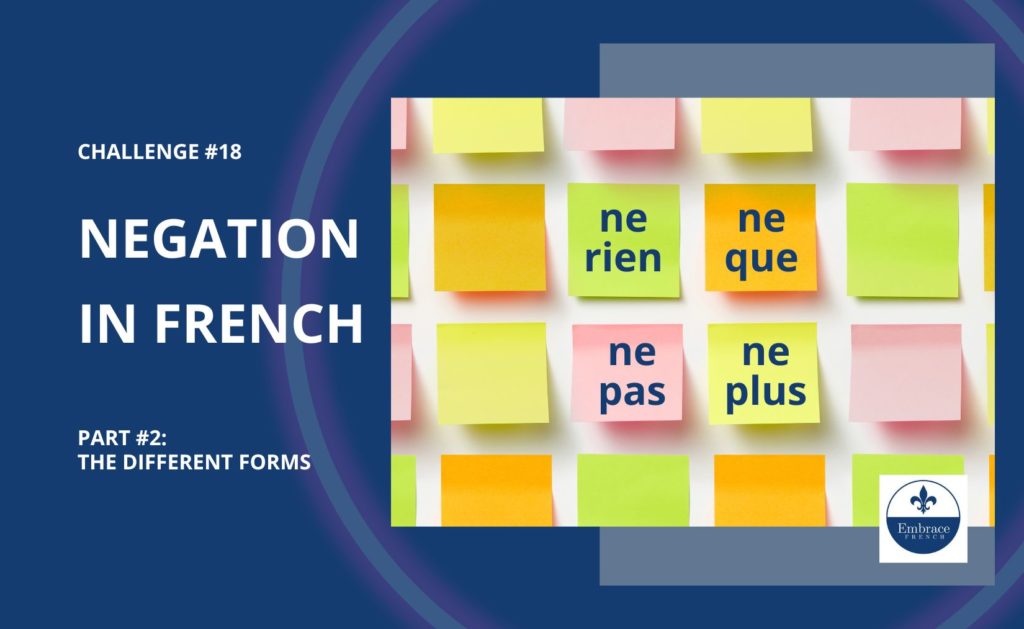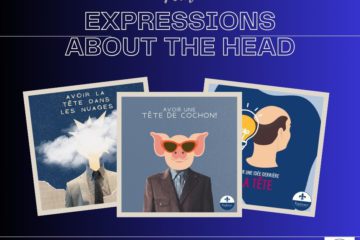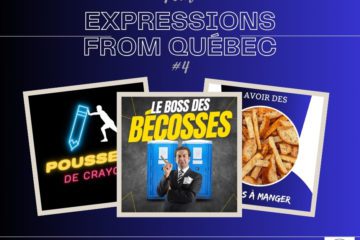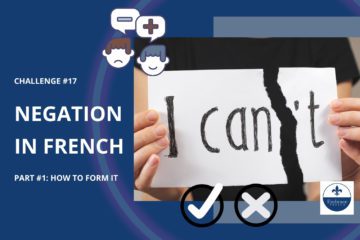Negation in French
Part #2: The different forms of negation
CHALLENGE #18

Welcome to the second part of our French negation challenge. In the first part, we saw how to form negation. If you missed it, I suggest you check it out before doing today’s challenge: the different forms of negation in French.
Last time, we looked at the most common form: “ne…pas”, the equivalent of “don’t”. However, if you want to fully express your ideas and opinions, it’s just as important to understand the different forms of negation: “ne…jamais” (never), “ne…rien” (nothing), “ne…personne” (nobody) and “ne…plus” (no more).
We will also look at « ne…que », which is a bit of a challenge for most English speakers learning French, since its English equivalent is « only ».
Rest assured, nothing will be complicated, and I’m going to use this post to make all the different negation forms a child’s play for you!
The various negations in French
Ne + pas = Do not
“Ne…pas” is the most common form of negation in French. It’s the equivalent of “do not/ don’t” in English. Since we explored it in depth in the last post, I won’t say any more about it this time. To use it, you “wedge” the verb between the “ne” and the “pas”.
- Je ne parle pas français. (I do not speak French.)
Ne + jamais = Never
The expression “ne…jamais” is used to express the negation of an action in the sense of “never”. It is often used to indicate that an action has never taken place or will never take place.
- Vous ne faites jamais d’erreurs. (You never make mistakes.)
- Je ne viens jamais aux réunions. (I never come to meetings.)
- Il ne mange jamais de viande. (He never eats meat.)
Ne + rien = Nothing
In French, the expression “ne…rien” is used to express the total negation or complete absence of an action or thing. It is frequently used to indicate that there is no quantity or action. “Ne…rien” emphasizes the idea of total absence concerning the action mentioned.
- Ils n’ont rien mangé. (They ate nothing.)
- Tu ne vois rien. (You see nothing.)
- Elle ne comprend rien. (She understands nothing.)
Ne + personne = Nobody / No one
This structure is often used to say that there is no one, that no one has done something, or that something has not been done by anyone.
- Je ne vois personne. (I see nobody. / I don’t see anyone.)
- Il n’y a personne à la porte. (There is no one at the door.)
- Nous n’avons invité personne à la fête. (We didn’t invite anyone to the party.)
Ne + plus = No more / not anymore / no longer
“Ne…plus” is used to mark the continued negation of an action or situation over time. In other words, it indicates a change in time, emphasizing that the action or situation described is no longer in progress or true. The expression is often translated as “no longer”, “not anymore” or “no more”.
- Je n’aime plus le café. (I no longer like coffee. / I don’t like coffee anymore.)
- Il ne travaille plus ici. (He doesn’t work here anymore.)
- Vous ne chantez plus dans le chœur. (You don’t sing in the choir anymore.)
Ne + Que = Only
In French, the expression “ne…que” is used to express limitation or restriction to a single thing or person. For my students whose mother tongue is English, it’s always a bit of a challenge. Indeed, its meaning in English is “only”. For example, if I say “il ne boit que du thé”, my beginner students will often think that the meaning is “he doesn’t only drink tea”, when in fact it’s “he only drinks tea.”
- Je ne mange que des fruits. (I only eat fruits.)
- Elle ne parle que portuguais. (She only speaks Portuguese.)
- Je n’aime que les chiens. (I only like dogs.)
Impersonal il + ne + que = There is only / There are only
Since there is no “it” in French, we sometimes use the pronoun “il” in an impersonal way, i.e. to talk about a thing, a situation or a context. For example, the impersonal “il” paired with the negation “ne…que” is used to mean “there is/are only”.
- Il n’y a qu’un enfant ici. (There is only one child here.)
- Il ne reste que deux places de disponibles. (There are only two seats available.)
- Il n’y a que des pommes dans le panier. (There are only apples in the basket.)
Your challenge: choose the right negation
For your challenge, I am giving you sentences that are already negative, but it’s up to you to choose what goes with the “ne”. Your possible answers are: pas, jamais, rien, personne, plus and que.
As usual, the answers can be found on our Facebook page.
- Je ne veux ___ manger, je n’ai pas faim.
- Elle ne vient ____ aux réunions.
- Pierre ne bois ___ d’alcool.
- Vous n’avez ___ goûté ce plat exotique.
- Je ne bois ___ de café le soir.
- Il n’y a ___ de belles maisons sur cette rue.
- Je ne connais ___ qui ait résolu ce problème.
- Tu n’as ___ visité le Portugal.
- Nous ne possédons __’une voiture dans notre famille.
- Elle n’a ___ confiance en lui après cette trahison.
- Nous ne comprenons ___ ce problème de mathématiques.
- Elle n’a ____ avec qui partager ses secrets.
- Nous ne vivons ___ dans cette ville depuis des années.
- Tu n’as ___ quelques minutes pour terminer cette tâche.
- Nous ne voyons ____ dans la rue.
- Je ne veux ____ admettre mes erreurs.
- Il ne mange ___ de viande depuis qu’il est devenu végétarien.
- Il ne parle ___ français.
- Tu n’as ___ oublié d’acheter du pain.
- Nous n’avons ___ entendu de la conversation.
- Tu n’as ____ à blâmer sauf toi-même.
- Il ne reste ___ à faire pour terminer ce projet.
- Hier, elle n’a ___ rencontré mon frère.
- Tu n’as ___ besoin de m’aider.
- Elle n’a ___ 15 ans et elle est déjà à l’université.
- Il n’y a ___ de drôle dans cette blague.
- Nous ne devrions ___ ignorer les avertissements.
- Il n’y a ___ à la porte.
- Tu n’as ___ à craindre, je suis là pour t’aider.
- Je ne veux ___ de sucre dans mon café.
Have you downloaded your free guidebook package?

You can now download a free learning package on the 20 most commonly used verbs in French, conjugated in the present tense. This set includes an ebook with all the verbs and a sentence for each person (je, tu, il, elle, nous, vous, ils, elles), an Excel file to add all the concepts from the ebook to your flashcards application and a video where you can hear me pronounce these verbs and sentences. And it’s free! Download it now!


